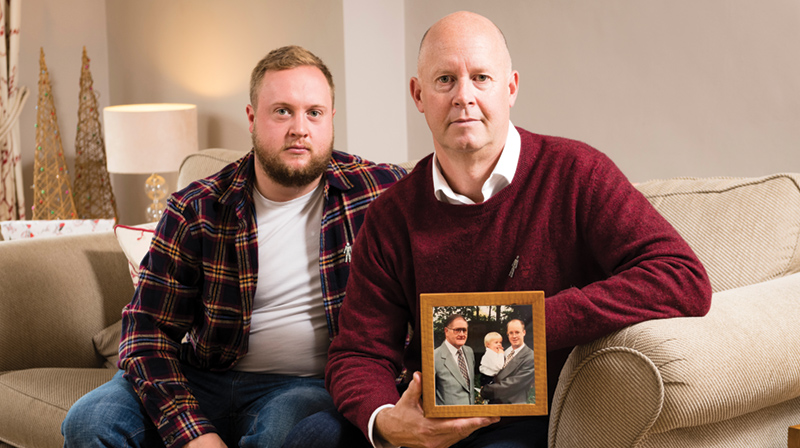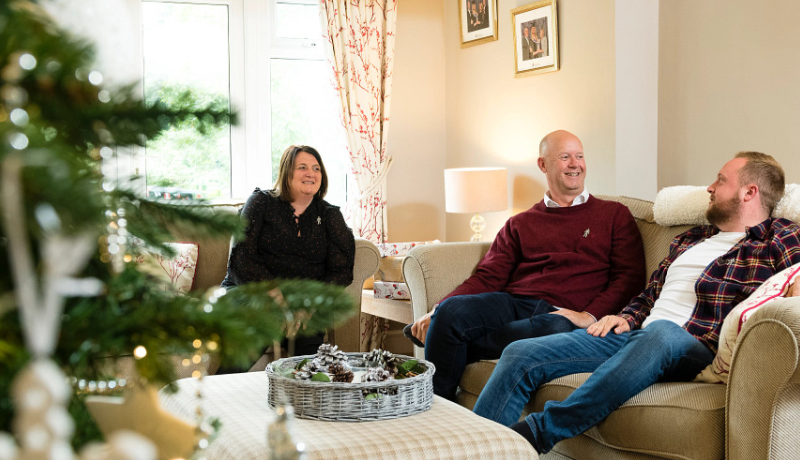Research
04 Nov 2021Steve’s dad died of prostate cancer. He was cured but still suffers side-effects. Now he wants much more for his son.
Exploring the progress and potential in prostate cancer care through a grandfather, father and son.
When Steve’s father was diagnosed with prostate cancer 20 years ago, he didn’t speak about it at all; treatments were limited and support barely existed. The picture has changed massively since then, but not enough. Steve hopes his son won’t have to worry about prostate cancer at all. Steve told his story to help us improve radiotherapy:
I was diagnosed over Christmas. We were spending the weekend with friends, and they noticed I was going to the toilet a lot. They told me it wasn’t right and that I should go see the doctor.
I had a PSA test, and two days later got a call from the doctor telling me to come in. I felt like I already knew it was prostate cancer - both my father and grandfather had the disease, so I knew I was at risk. But I still broke down in tears when they told me. Something about those words, ‘You have cancer’, are so powerful.
Luckily, my cancer was caught just before it spread outside the prostate, so it was possible to cure it. I opted for radiotherapy. It felt like a better option than surgery and I heard the side effects were less severe. I had 37 doses of radiotherapy in total. It meant seven weeks of traveling every day from where I live in Essex to the hospital in London. The treatment really weakened my bladder, and towards the end I had to go to the toilet every hour or so, even through the night. It was probably the worst time of my life.
I met others in the hospital who were only having 15 or 20 doses, and their side effects weren’t nearly as bad. So it was hard for me to understand why my experience was so severe. Even now, my bladder isn’t back to normal and I struggle with erectile dysfunction.
Sometimes I wonder whether I should have had it removed instead. But no treatment is perfect, they all cause some level of side effects, especially when the cancer is aggressive like mine was.

Two years on, and so far I’ve been given the all clear. It makes me realise how far treatment has come - my father had radiotherapy too, but it wasn’t able to cure him. His disease returned a few years later, and this time there weren’t any treatment options left for him.
By the time I was treated the technology had massively improved. 20 years ago, they wouldn’t have known how aggressive his cancer was and how much radiotherapy was needed to kill it. But for me, they could help tailor my treatment and deliver the intense dose that I needed, even if it did leave me with bad side effects.
It makes me realise how far treatment has come - my father had radiotherapy too, but it wasn’t able to cure him. His disease returned a few years later, and this time there weren’t any treatment options left.
I never got the chance to talk about prostate cancer with my dad. By the time I was diagnosed he was suffering with dementia, so we thought it would be best not to tell him. It was hard, as it would have been nice to share this with him. I know he felt like he couldn’t talk about his disease at the time.

Things are so different now. Men are more willing to talk about prostate cancer, and it’s definitely for the better. I talk to my son, and he knows he’s at higher risk because of our family history.
He’ll start getting tested from 45, but I want to make sure that even if he does get prostate cancer, his treatments are better than mine, and he doesn’t suffer the same side effects that I have.

That’s why it’s so important we fund research. We’ve seen how much things can improve thanks to research, and even a small donation can go a long way. This disease is so common - we will all know someone who is affected, so anything people can spare could have a huge impact on thousands of men.
Radiotherapy is a powerful treatment for men with localised prostate cancer.
But as few as 1 in 4 men with aggressive prostate cancer will be successfully cured of their disease. The research you help fund today will lead to better treatments, and fewer lives limited by prostate cancer.
Dr Jonathan Coulter aims to harness the power of gold, yes, GOLD, to cure more men with aggressive prostate cancer. His work focuses on minuscule particles of gold, called nanoparticles, and their effect on radiotherapy.
Inserting the gold nanoparticles into prostate cancer cells amplifies the effect of radiotherapy treatment, making sure the cancer cells die. This makes radiotherapy a more accurate treatment than ever before, even when lower doses are used.

